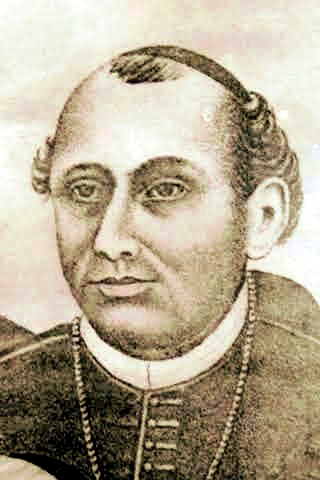
A portrait of D Matheus de Castro from Divar, the first native bishop consecrated in the Latin rite from India.
D Matheus de Castro from Divar was the first native bishop consecrated in the Latin rite from India who had even revolted against the Portuguese in the 17th century, but sadly this precursor to Goa’s liberation has been largely forgotten over the ages.
Castro was born in 1594 in Malleavaddo-Goltim on Divar island. After he lost his parents at a very young age, he was practically brought up and educated in the Franciscan seminary at Reis Magos in Bardez.
He showed a great desire to join the Franciscan order, but was refused permission by Archbishop Christivao de Lisboa because he was not a Portuguese.
However, Castro befriended some Carmelite priests and on the recommendation of Fr Leander of Annunciation, founder of Carmelites in India, went to the Carmelite house in Isfahan-Iran and from there to Rome, where the Carmelites introduced him to Cardinal Francisco Ingoli, Secretary of Propaganda Fide, who encouraged his vocation.
During that time, Venerable Fr Propser of the Holy Spirit, Restorer of Mount Carmel, helped him and Matheus de Castro was ordained in 1630 as a priest in the Congregation of Oratorians.
He was appointed as Prior of the now extinct parish of N Sra da Luz in Old Goa. However, the Portuguese civil and ecclesiastical authorities did not accept him.
Rejected, D Matheus de Castro left for Rome and in 1652, was ordained as titular bishop of Chrysopolis. He was not just the first native Goan bishop, but the very first native bishop of India in the Latin rite. He was also appointed as Apostolic Vicar of the Kingdoms of Adilshah, Burma, Golconda and Abyssinia in Ethiopia and also as the founder missionary for all these new missions.
The Vatican also appointed him as the Inquisitor General, becoming the first native Inquisitor from India. The Portuguese also had their inquisition tribunal which brought pain and misery for countless people. But Castro, though being an Inquisitor General, didn't get involved in such activities, but openly opposed the Portuguese rule.
Soon after his arrival in India as bishop in 1653, Castro raised a banner of revolt against the Portuguese. He sent strong reports to Rome against Church authorities in Goa and especially the discriminatory policy adopted by the Jesuits of that era. He proposed the same to the Mughal Emperor Shah Jahan and convinced him so much so that it had a great impact on the Mughal-Jesuit relationships.
The Portuguese viceroy complained to the King of Portugal that Castro was very harmful to the interests of the crown. He wanted to liberate his motherland from the Portuguese yoke and for that he conspired with the Dutch and Adil Shah.
The Archbishop of Goa reported in very harsh terms to Rome saying that Castro was giving assistance to the Sultan of Bijapur against the Portuguese.
In a pastoral letter in 1653, Castro practically incited the population of Goa to rise against the Portuguese. He emphasised that Goans should not be treated as 'slaves' and established in Bijapur a new mission under Propaganda Fide and the present Milagres Church, Mudipu, Mangalore became the centre of the movement of resistance against Portuguese colonial patronage.
He was supported by the Hindu queen of Bijapur in this initiative. He founded small rural churches in Bicholim, Banda and Vengurla.
When the Portuguese did not favour native vocations, Castro formed a local congregation under the rules of St Filipe de Neri and ordained as priests at least 26 Goan boys. The Archbishop of Goa, however, opposed this ordination.
Castro died on July 20, 1679 and according to one opinion, he died at Bicholim while another states that he died in Rome.
It is sad that this precursor to Goa’s liberation is not well-known or remembered and not even a statue in his honour exists even in his own home town of Divar. It is, however, imperative to remember that a Goan bishop sowed the early seeds for Goa’s liberation.
(The writer is a Goa-based researcher on the Carmelite religious congregation)